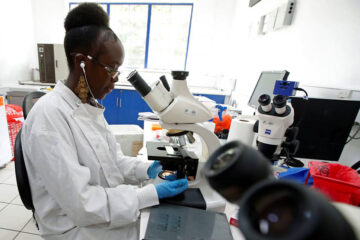UNIVERSITIES had to deal with many anxieties and uncertainties during the early days of the COVID pandemic. One of these was how to move all of their teaching online. For some, the process was fairly simple as they had already been offering blended online and in-person lessons.


But many were caught on the wrong foot. We wanted to know how the pandemic had affected training and technology adoption by lecturers at open-distance learning institutions in Africa. To find out, we conducted research at two of the continent’s biggest open-distance universities – one in Nigeria and one in South Africa.
We found that, as was the case for many higher education institutions, neither institution was ready at the start of the pandemic for the move to entirely online teaching. This is even though both universities in our study were already using some online learning management systems and digital media to facilitate learning and support students.
Most lecturers we spoke to said they were unprepared for the shift to remote teaching. They had not received or sought relevant training and, so, they were also not able to give their students the necessary support. Training units at the institutions were inundated with requests and couldn’t handle the number of requests from lecturers who wanted to get to grips with their institution’s learning management systems.
The findings confirmed that training for academics needs to be timely, specific, relevant and appropriate for the technology being implemented. If not, it leaves lecturers confused and unable to use relevant teaching and student support technologies. We suggest that all university staff – especially those responsible for the professional development of others – receive regular and continued training to keep themselves relevant and effective.
Unprepared and unsure
The two universities collectively serve more than half a million active learners. We interviewed 20 participants from the institutions, most of them academics and many in senior management positions.
The pandemic marked the first time that most lecturers were forced to interact with their institutions’ online teaching tools. Previously, most of the participants said, they’d avoid these tools and systems, finding them too time-consuming. They were not mandated to use these tools, neither institution had comprehensive e-learning policies to effectively regulate and enforce the transition to online teaching.
This meant that, when the pandemic started, many had no idea how to use online learning tools.
One interviewee, who works in the South African institution’s Centre of Professional Development and is responsible for training, told us:
During the lockdown in March 2020, we got many training requests for Microsoft Teams. Microsoft Teams was introduced in 2018; we used to train two, three, less than ten people, but came March 2020 … we were overwhelmed with training requests, especially from academics.
The universities’ Information and Communication Technology departments were also inundated with requests for basic training like changing the computer password, backing up files and using programs like Microsoft Teams. These skills should, ideally, have been mastered way before the pandemic.
Some green shoots
Some positive trends emerged from our research, too. Lecturers had no choice but to “adapt or die” – they had to learn about the technology needed for teaching online. Not only did formal requests for training rise, but many academics also turned to more digitally savvy colleagues for training and advice. Participants at both universities told us their institutions’ general level of computer and digital skills had improved significantly since the onset of the pandemic.
Those lecturers who already regularly used the universities’ learning management systems and other available digital tools effectively before the pandemic became champions of digital innovation. One interviewee said:
We had champions and ‘flowers’ that were flourishing that suddenly came out and helped through training, mentoring and helping other colleagues how to do certain things.
We also found that all the research participants from both universities were enthusiastic about the opportunities, benefits and future of e-learning in Africa. They realised how technology could help to increase access to higher education by reaching learners even in remote areas.
The way forward
Based on our findings we recommend that education institutions design evaluation and monitoring strategies to continuously audit and assess their teaching staffs’ digital skills. Training and development must be relevant to teaching and learning through technologies for lecturers and students.
Higher education institutions also need comprehensive e-learning policies to regulate and enforce the transition and proper implementation of online teaching and learning.














